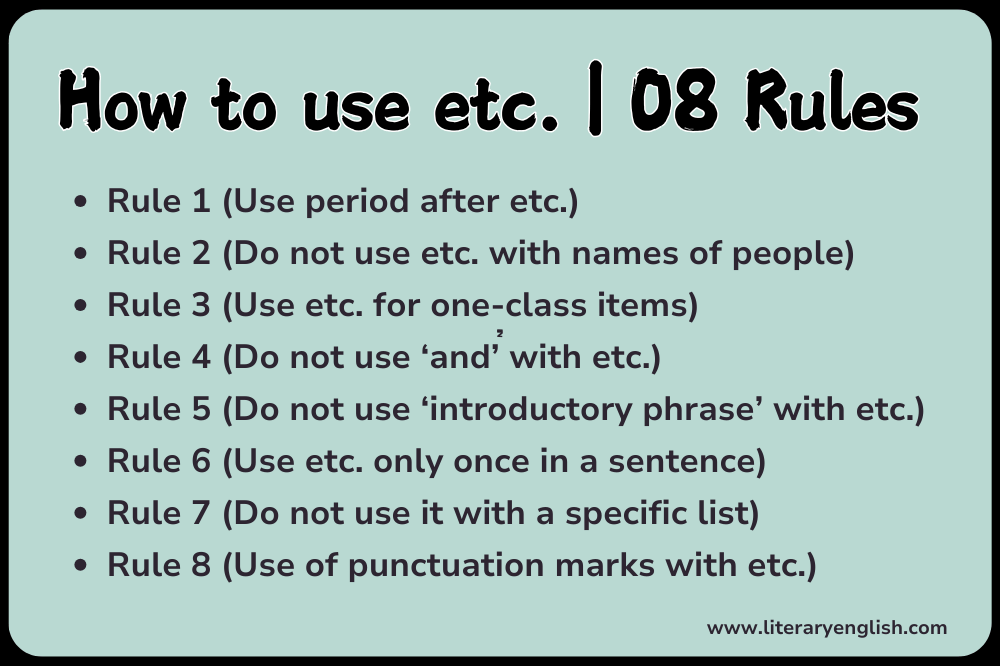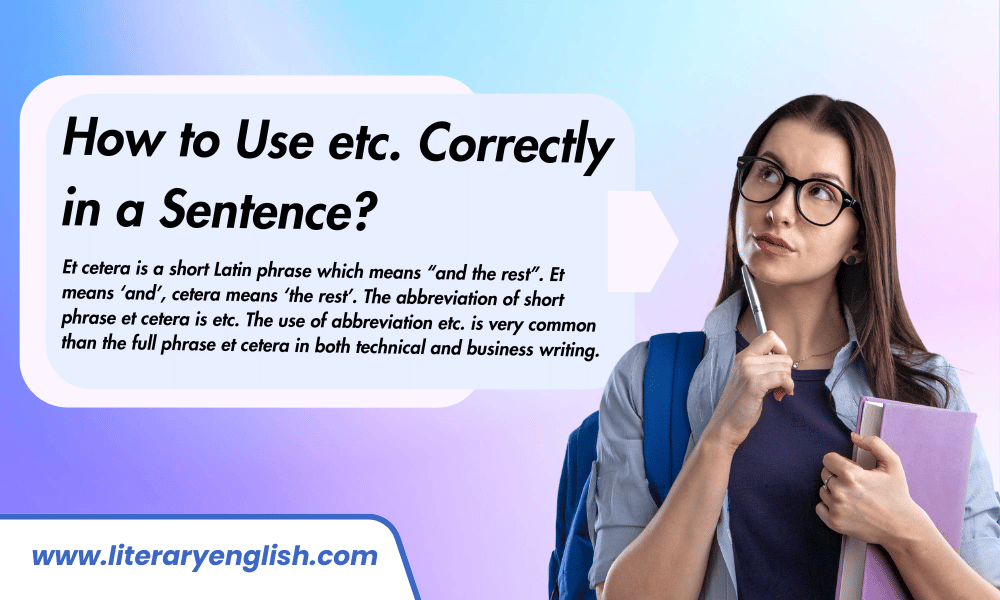How to Use etc. Correctly in a Sentence?
Et cetera is a short Latin phrase which means “and the rest”. Et means ‘and’, cetera means ‘the rest’. The abbreviation of short phrase et cetera is etc. The use of abbreviation etc. is very common than the full phrase et cetera in both technical and business writing.
Many people are confused about how to use etc. correctly in a sentence or how to pronounce etc. correctly. In this lesson, you will learn the proper usage of etc. in a sentence.
Etc. is always used for ‘so on’ and ‘other things’. If we have a lot of thing in mind to tell or write then we use etc. with few words and replace other words by using etc. simply. It shows that there are other items in the sentence belonging to the same class.
Some basic rules to etc. in a sentence
Here are some rules to use etc. correctly in a sentence. These rules will help you to use etc. correctly in academic writing, business writing and technical writing.

Rule 1 (Use period after etc.)
In English writing, all the abbreviations are followed by period (full stop). Etc. is always followed by punctuation mark either in the middle of a sentence or at the end of a sentence. If you are using it in the middle of the sentence, then you will put a period (full stop) and a comma after it (etc.,) to continue sentence and if it is enclosed in parentheses, you will put only period (full stop) either in the middle of sentence or at the end of the sentence. If someone is using it at the end of sentence at that time it will be followed by period (full stop) only.
- I asked Ali to bring cola, juice, mineral water, etc for the night party. (Wrong sentence)
- I asked Ali to bring cola, juice, mineral water, etc., for the night party. (Correct Sentence)
- I asked Ali to bring some items from the mart (cola, juice, mineral water, etc.,) for the night party. (Wrong sentence)
- I asked Ali to bring some items from the mart (cola, juice, mineral water, etc.) for the night party. (Correct Sentence)
Rule 2 (Do not use etc. with names of people)
Always keep one thing in your mind while using etc.; do not use it with the name of the people. This is the only exception where we cannot use etc. in a list of names of people.
“Et Alia” is a separate short Latin phrase which means ‘and others’ like ‘Et cetera’ (etc.). You can use “Et alia” (et al.) for the people. “Et al.” is most commonly used in a list of people, particularly in academic writing when referring to the authors of an academic publication.
- I met to Ali, Jam, Lizzy, Jany, Tom, etc. (Wrong sentence)
- I met to Ali, Jam, Lizzy, Jany, and Tom. (Correct sentence)
- Sajid, Jam, Ravi, etc., wrote a report on pollution. (Wrong sentence)
- Sajid, Jam, Ravi, et al., wrote a report on pollution. (Correct sentence)
Rule 3 (Use etc. for one-class items)
Always use it in one-class items means the item in the list should be of the same kind. When we use etc. in a sentence, it means there are other items related to the same class mentioned in the sentence. To understand it better, look at the examples below with usage.
- Mango, banana, grapes, apricot, motorbikes, electric fan etc., are cheap in Pakistan. (Wrong sentence)
- Mango, banana, grapes, apricot, etc., are cheap in Pakistan. (Correct sentence)
- Mango, banana, grapes, apricot, motorbikes, and electric fan are cheap in Pakistan. (Correct sentence)
Rule 4 (Do not use ‘and’ with etc.)
Do not use the word ‘and’ while using etc in the middle of the sentence or at the end of a sentence. Since the “et” in “et cetera” already means “and,” it would be redundant to use “and” with “etc.”. Never use “and” when using “etc.” in a sentence.
- I bought oil, salt, sugar and coffee etc., from the market. (Wrong sentence)
- I bought oil, salt, sugar, coffee etc., from the market. (Correct sentence)
Rule 5 (Do not use ‘introductory phrase’ with etc.)
Do not use etc when introductory word like such as, like are in the beginning of the sentence.
- Bring items such as chocolates, cakes, ice cream, etc., for the night party. (Wrong sentence)
- Bring items such as chocolates, cakes, and ice cream for the night party” (Correct sentence)
Or
- “Bring chocolates, cakes, ice cream, etc., for the night party.” (Correct sentence)
Rule 6 (Use etc. only once in a sentence)
Avoid using etc. more than once in a sentence. Some people think it’s cute to use “etc.” more than once in a sentence or they want to focus on other items by writing etc thrice.
- I have to buy shoes, socks, cap, gloves etc., etc., etc., from my salary. (Wrong sentence)
- I have to buy shoes, socks, cap, gloves etc., from my salary. (Correct sentence)
Rule 7 (Do not use it with a specific list)
Do not use “etc.” if there is a specific list of items that you need. If you only need juice, cake, and cookies for the supper; do not use etc. Using etc. in the sentence will make the reader or listener confused that you may need other items like dessert also for the party.
- Please fetch juice, cake, cookies, etc, for the supper. (Sentence is wrong if only three items in the list are needed)
- Please fetch juice, cake, and cookies for the supper.
Rule 8 (Use of punctuation marks with etc.)
As you have learned that etc. is always followed by period (full stop). What we will do if we have to use other punctuation marks like question mark, colon, or any other punctuation mark. Its answer is simply that you can use any punctuation mark (question marks, exclamation marks, semi-solons or colons) after etc. but after period like comma in the middle of the sentence. When we are using it at the end and sentence ends at a period, then we will use only one period. Look at the examples below to understand it in a better way.
- Is he going to buy plates, cups, napkins, etc? (Wrong sentence)
- Is he going to buy plates, cups, napkins, etc.? (Correct sentence)
- I hate watching movies, dramas, etc! (Wrong sentence)
- I hate watching movies, dramas, etc.! (Correct sentence)
